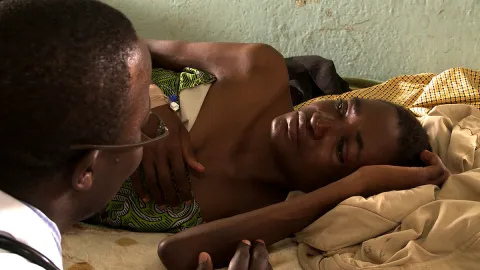Could the 2016 UNGASS deliver increased access to pain relief for cancer patients?
19 April 2016 - The 2016 UN General Assembly Special Session (UNGASS) on the World Drug Problem opens today at the UN Headquarters in New York. Governments, UN bodies and civil society will come together to evaluate global drug policy and discuss how to address the most pressing challenges going forward.

Why is the 2016 UNGASS important for the cancer community?
Every year more than 5.5 million terminal cancer patients suffer from moderate to severe pain that is not managed at all. Although UN bodies and agencies have repeatedly expressed concern about the limited availability of controlled medicines such as morphine, a concerted, multi-sectorial response has yet to be implemented. The 2016 UNGASS on the World Drug Problem is an extraordinary opportunity to set in motion this kind of response.
The Union for International Cancer Control (UICC) has closely followed the intensive preparatory processes leading up to UNGASS 2016, participating in relevant sessions of the Commission on Narcotic Drugs, side events and other interactive dialogues.
In collaboration with a global network of palliative care advocates, UICC has leveraged these events to maintain pressure on Member States to fulfill their obligation of ensuring the availability of controlled substances for medical and scientific purposes while preventing their misuse and diversion.
What will happen at the 2016 UNGASS?
Member States are expected to adopt an Outcome Document embodying the international ‘joint commitment to effectively addressing and countering the world drug problem’.
It is encouraging to see that the preamble of the UNGASS Outcome Document recognises that “the availability of internationally controlled drugs for medical and scientific purposes, including for the relief of pain and suffering, remains low to non-existent in many countries of the world, and we highlight the need to enhance national efforts and international cooperation.”
We should also see the insertion of a stand-alone section on availability and access to controlled medicines as a notable “win”. It contains a number of operational recommendations on legislation and regulation; healthcare professional training; prescription, dispensation and administration; clinical guidelines; essential medicines lists; awareness-raising campaigns; supply management; and technical and financial assistance to developing countries.
What impact could the 2016 UNGASS Outcome Document have?
Increasing access to palliative care including pain relief requires a whole-of-government, whole-of-UN response, as it involves regulatory and enforcement infrastructure, health system strengthening, including health worker training, and development-related measures. The adoption of this Outcome Document by Member States could help mobilise international cooperation, technical assistance, and funding to support these efforts. Crucially, it can also provide advocates with a powerful tool to drive the policy changes and investments needed to increase access to controlled medicines such as morphine, that could alleviate pain and suffering of millions dying from cancer and other illnesses.
Make it count
Whether or not the adoption of the UNGASS 2016 Outcome Document generates a much-needed change in global drug policy – UNGASS 2016 presents an opportunity for us, cancer advocates, to draw a spotlight on the unacceptable gap in access to pain relief. UICC will be co-hosting a side event on Wednesday 20 April on “Addressing global disparities in access to controlled substances for medical purposes, with focus on treatment and pain relief”. We encourage those of you planning to be in New York to please join us at the event. You can also follow live updates from the 2016 UNGASS on Twitter.
Last update
Friday 07 June 2019